#and their importance to history - especially katherine
Text
there has GOT to be a way to explain anne boleyn's proto-feminism and importance to history without absolutely shitting on katherine of aragon and acting as if she was basically set dressing for her entire marriage rather than a person in her own right and an important one at that, but i think a lot of stanne's are just virulently misogynistic so they're physically incapable of doing so
#personal#'anne was not catherine content to sit around and be paraded and sew her husband's shirts she hired a shirtmaker' dear god in heaven shut U#stanne's are incapable of viewing feminism through any other lens than 'not like the other girls'#like you do not need to constantly tear down all these other women from the era#and their importance to history - especially katherine#just to make anne look like some miracle#(i think a lot about that person who said anne was the most significant queen in english history)#(when she was a consort for only three years while england has had like six actual queen regnants including her own fucking daughter)#like there's this tendency people have to try and highlight anne's importance by just shitting on any other woman tangentially close to her#especially katherine cuz you know rivalry and all#like it's just deeply misogynistic i'm sorry#the inability to recognize the importance of the role katherine had as a consort and also as a person and a queen herself#it's just misogyny because she wasn't doing it in some fucking katniss everdeen way#anyway that's my contribution to anne's death day sorry girl but your fans are a fucking nightmare
24 notes
·
View notes
Text
Fantasy Guide to Regents and Regencies

A Regency is a period of time where another party rules of behalf of a monarch who is either too young, too ill or absent. A Regency can either be the monarch's own choice or a decision made for them on their behalf by a third part, usually government. Either way, a Regent is selected to act as temporary Head of State whilst the monarch is incapable of ruling.
Who can be a Regent?

A Regent is an important office, even though its a temporary one. Regencies of child monarchs generally either go to the Consort, though there are all sorts of reasons why this can be blocked. Sometimes governments and kingdoms are uncomfortable with foreign consorts with uncertain allegiances ruling the kingdom or sometimes the government just doesn't approve on the basis that they doubt the Consort's skill set. Other candidates for Regencies are nearly always family members such as uncles, aunts, cousins and even children of the monarch (especially if they are absent from the country or ill). But a Regent doesn't have to be a royal. They could just be a noble elected to the position (Sir William Marshall) or even one that siezes power for themselves (Richard of York) or even a council made up of Regents, headed by a Lord Protector.
Who makes a Regent?

As I mentioned before, monarchs can appoint the Regent that will replace them in certain cases. For instance, a monarch would chose the Regent if they were voluntarily leaving the country or they might designate a chosen Regent on their deathbed or just in case of emergency. But they wouldn't chose a Regent if they were ruled mentally incompetent. In those cases, the government would chose.
The Powers and Responsibilities of a Regent
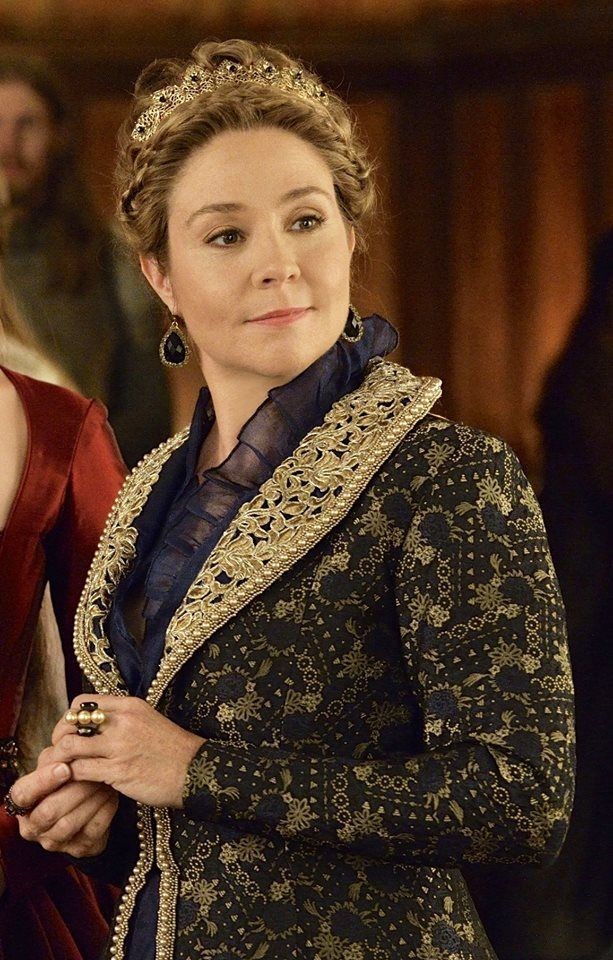
A Regent is the acting head of state but they are not the monarch. They do not have the right to wear crowns or have a coronation and are not granted the hall pass of divine right. A Regent is referred to as their own title, say for example Duke of X, Regent of Y or Prince Regent. They are merely there to fill in for the monarch. A Regent would meet with the government, make decisions with the approval by government and sign offical documents. In cases of an absent monarch, a Regent may need the approval of the monarch themselves. Regents of child monarchs would usually include their charges in the country's running, either as spectator or student. A Regent, being temporary Head of State, would also have the responsibility of ensuring a natural cessation of their power to their monarch when their term is over. Some regents are better than others at handing over power.
Notable Regents of History
George IV, Richard III, Anne of Austria, Katheryn Parr, Richard of York, Margaret of York, Katherine of Aragon, Catherine de Medici, Louise of Savoy, Phillippe duc de Orléans, Edward Seymour Duke of Somerset, Sir William Marshall, John Duke of Bedford, Humphrey Duke of Gloucestershire, John Dudley Duke of Northumberland.
#Fantasy Guide to Regents and Regencies#Regent#Royal guide#Fantasy Guide#Writing guide#writers resources#writing#writeblr#writing resources#writing reference#writing advice#writer#writer's problems#spilled words#writer's life#Writer's reference#Reference#nanowrimo
698 notes
·
View notes
Text
Happy Queer Media Monday!
Today: Dread Nation series by Justina Ireland
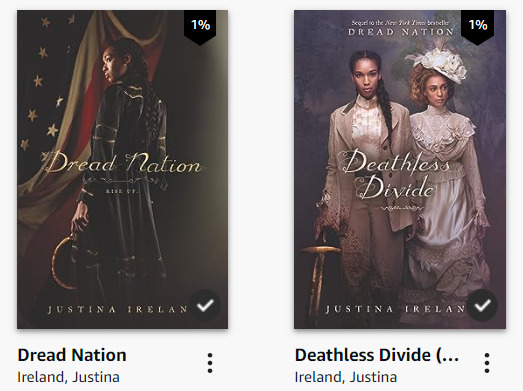
(The two books that contain the actual Dread Nation story photographed from my Kindle)
Dread Nation is an alternate history horror series set in a world where the American Civil War has been cut short by a zombie apocalypse. Some decades later, children of color are being sent to special schools where they get some training, mostly bad than good, then sent out to the fields to fight the zombies. Two of these girls are Jane McKeene and her school rival, Katherine Deveraux. When they get unexpectedly transported to a segregated town on the Western frontier, they have only each other left to rely on.
The strength of these books is that the only fantastic element in them are the zombies. The racist atrocities committed by various white characters, as well as the system at large, can all be recognized as things that actually happened to Black people in the history of the US.
Both main characters are disabled. Jane suffers a serious wound while fighting zombies in the second book, and Katherine has severe anxiety. They are also both queer, Jane is bisexual and Katherine is ace.
The Dread Nation book series consists out of three books: Books one and two (Dread Nation and Deathless Divide) are the actual story, while the third, Three for the Road, contains three short stories set in that world.
Queer Media Monday is an action I started to talk about some important and/or interesting parts of our queer heritage, that people, especially young people who are only just beginning to discover the wealth of stories out there, should be aware of. Please feel free to join in on the fun and make your own posts about things you personally find important!
#I know that everyone else is having Spooky Month but I swear that this wasn't because of that#it's just the books I thought about and felt like posting#I am an intellectual#I maintain that spooky time is CHRISTMAS and I will die on that hill#anyway really good books#I breathed the first one in within a day and didn't even notice until it was over#books#alternate history#horror#zombies#black representation#queer representation#disabled representation#Dread Nation#Queer Media Monday#bisexual character#asexual character
26 notes
·
View notes
Text
The T7S Gang. Who puts the most to least importance on naming their kid, a ranking.
Jackie: She has a massive list of names she likes. Mainly for girls, but whatever. A name is so important. It's like a brand name, but personal. It what makes them them, you know?
But of course, the name has to fit in. It can't be weird, or tacky. And girls' names should be melodic and feminine, not ugly and masculine. She loves Jessica, Olivia, Sarah, Gabrielle...
Donna: A name is important, and it has to have history, precedence, and meaning. No super trendy stuff, although she occasionally has the impulse. Classic names that stand the test of time are classic for a reason, and they look good on college applications. Charlotte, Emma, Alexandra. Robert, Alexander. Even though it's such a warped concept, often with racist undertones.
Eric: A name is important, especially family ones. It's an expression of who somebody is, and who their family is. If it's too weird, though, that's fodder for bullying. And he doesn't want that. His kid is already going to have enough problems as it is. Why make things more difficult? Keep it simple, and generally normal, but with some meaning. Luke and Katherine. Maybe a Mark, a Sarah (his little princess), or a Lucy (Luke, gender swapped).
Fez: A name is an experiment, sprinkled in with some meaning, and it's fun.
Hyde: He'll name a kid after someone that means a lot to him, like Katherine (after Kitty) or William (after WB), or a name with a good meaning (Sophie means wisdom, cool). But he's not that picky, unless his partner wants something really trendy and/or stupid.
Kelso: He'll let his partner take the reins, unless they want to name their kid Bertha or something really ugly. He'll randomly throw some trendy names out there, but if the mother is Brooke, he'll firmly be rejected.
#that 70s show#that 90s show#eric forman#jackie burkhart#donna pinciotti#steven hyde#michael kelso#fez#my essays
8 notes
·
View notes
Text

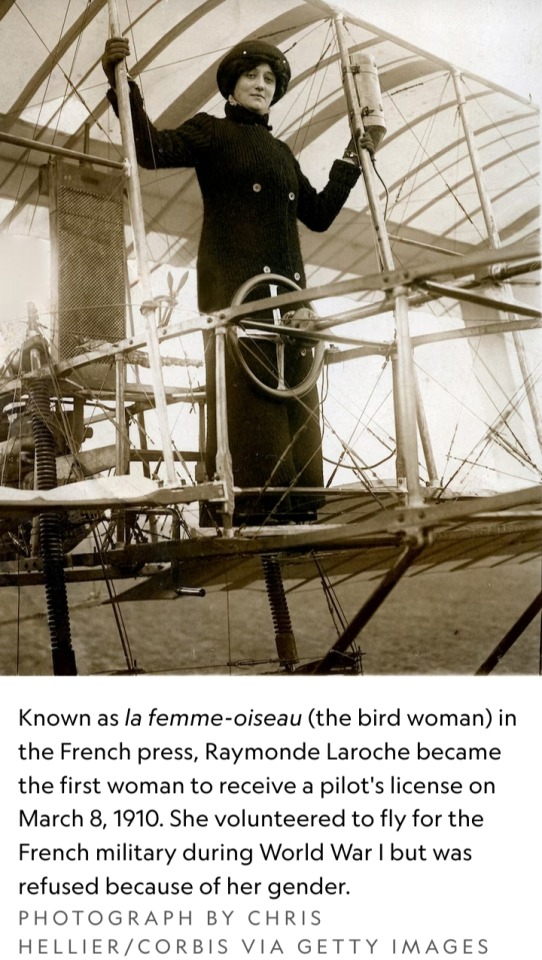
By Rachel Hartigan
Published: 9 March 2023
The history of the first women who flew is a tale of breathtaking bravery and lives cut tragically short.
On 8 March 1910 — 113 years ago today — Raymonde de Laroche, a former Parisian stage actress, became the first licensed female pilot in the world.
Nine years later, she was killed when the experimental aircraft she was flying dove into the ground.
Harriet Quimby, a well-known journalist, became the first American woman to obtain a pilot’s license in 1911.
She died a year later when her new plane pitched her into Boston Harbor.
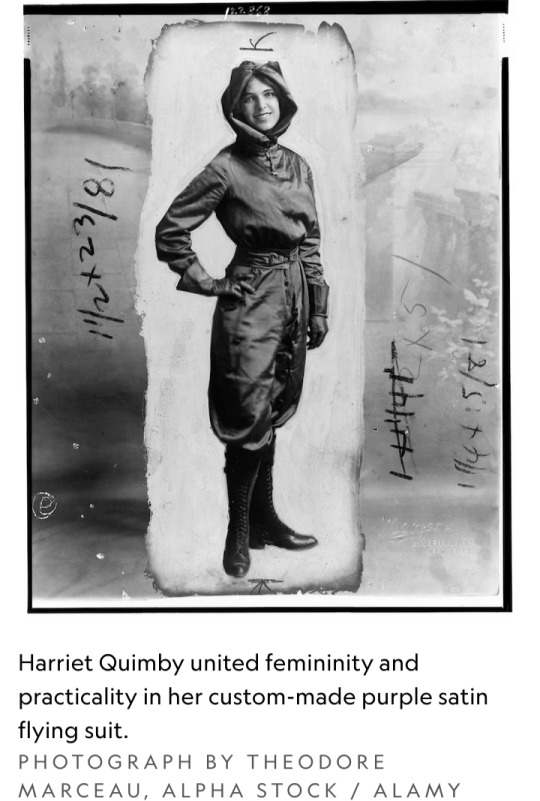
In 1921, Bessie Coleman was the first Black woman to receive a pilot’s license — she had to travel to France to find a flight school that would teach her.
But five years later, she was killed when a wrench got caught in her plane’s controls, sending the plane plummeting.
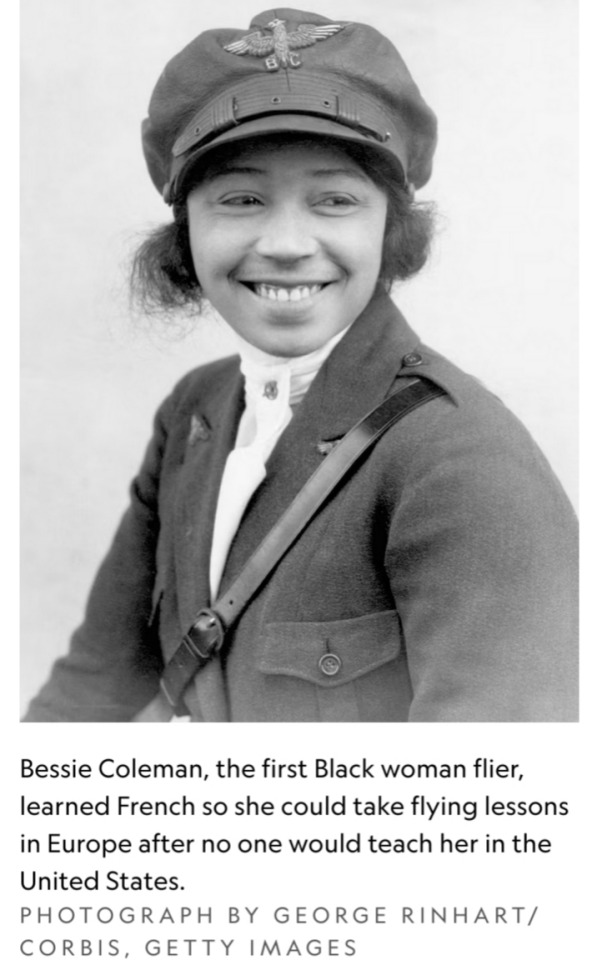
Flying was perilous in aviation’s earliest days.
"The planes were flimsy contraptions fashioned from bamboo, wire and fabric,” according to the late historian Eileen Lebow.
They didn’t have seat belts or even a roof to hold the pilot should the aircraft flip over.
Yet women like Laroche, Quimby and Coleman were willing to risk their lives for the freedom that flights promised.
“Aviation was a new profession seemingly free from the gender expectations and sex typing that limited women elsewhere,” noted historian Susan Ware at the National Air and Space Museum’s inaugural Amelia Earhart Lecture in Aviation History in 2022.
“Women were getting in at the beginning.”
For many of them, the thrill of flying was intoxicating but so was the opportunity to be assessed on their own merits.
“These women wanted to be judged as human beings rather than as women,” says Ware.
Coleman especially saw flight as a path toward broader gender and racial equality.
"I knew we had no aviators, neither men nor women, and I knew the Race needed to be represented along this most important line,” she said shortly after she returned to the United States from France in 1921.
“I thought it my duty to risk my life to learn aviating and to encourage flying among men and women of the Race who are so far behind.”
Before she died, she’d planned to open a flight school that would welcome African American aviators.
Many early women fliers shared the dream that achievement in this field would lead to more independence.
As one journalist and amateur pilot wrote in 1930, “A woman who can find fulfillment in the skies will never again need to live her life in some man’s spare moments.”

Some of that independence would come from the ease of travel that aviation promised in its earliest incarnation.
Many people, including Amelia Earhart, believed at first that airplanes would become as commonly owned by families as bicycles and automobiles already had.
Other women embraced the financial independence that they thought the new field would offer.
Neta Snook, whose first solo flight was in a plane she rebuilt, made her living by offering up her plane for aerial advertising, test flying experimental aircraft, taking paying passengers up for aerial tours, and teaching beginning fliers, including Earhart.
Gladys Roy, on the other hand, earned good money as a stunt pilot, dancing the Charleston and playing tennis on the wings midflight for amazed crowds at air shows.
(Snook retired from aviation when she became pregnant in her mid-twenties and lived to be 95; Roy died at 25 when she accidentally stepped into a propeller.)


Sisters Katherine and Marjorie Stinson took a more long-term approach, establishing a flight school in Texas with their mother and brother that trained, among others, Canadian pilots in the run up to World War I.
When the U.S. entered the war, the country’s civil aviation — including the Stinson School for Flying — was shut down.
Katherine went to Europe to serve as an ambulance driver while Marjorie became an aeronautical draftsman for the Navy.
War and the development of commercial aviation conspired to dampen women’s hopes of equality in the air.
Experienced women pilots such as LaRoche and Katherine Stinson volunteered to serve in their countries’ nascent air forces during World War I.
They were denied, the military preferring to train unseasoned men.
The same pattern occurred in World War II, although Women’s Airforce Service Pilots (WASPs) did ferry U.S. military planes as civilian pilots during the conflict.
(The Soviet Union, however, had three female air combat regiments.)

The dream of every family owning a private plane never did materialize; the infrastructure required would have been too extensive.
Instead, the commercial aviation industry developed, hiring men — many of whom had been trained as pilots by the military.
It was no use pointing out, as Earhart did, that "if women had access to the training and equipment men had we could certainly do as well."
Helen Richey became the first female commercial pilot in 1934 but was hounded out of her job.
The U.S. Commerce Department, under pressure from the all-male pilots’ union, decreed that women weren’t allowed to fly scheduled routes in bad weather.
(They’d previously considered “grounding female pilots for nine days a month during menstruation,” according to Ware).
There wouldn’t be another female commercial pilot until 1973, when Emily Howell Warner was hired by Frontier.

#Raymonde de Laroche#Harriet Quimby#Bessie Coleman#Eileen Lebow#Susan Ware#National Air and Space Museum#Amelia Earhart#Neta Snook#Gladys Roy#Katherine and Marjorie Stinson#Women’s Airforce Service Pilots (WASPs)#Helen Richey#Emily Howell Warner#female pilot#International Women's Day#International Women's Month#National Geographic#Nat Geo
52 notes
·
View notes
Note
🌻
Your turn
I feel kinda bad, because mine isnt as deep as yours but still.
I'm currently reALLY obsessed with Henry the VIII's wives and their history. Especially Katherine Howard sparks my interest. I find it kinda sad that beside bring a teenager, most people find Anne Boleyn more interesting. I understand that she was important for political reasons (the church etc.) but Katherines story is just so tragic.
Jane Seymour is also one of the most interesting wives to me, I could talk hours about her. Most people just ignore her, i feel like, but the reasons for behavior are very fascinating for me. I love to read things about her. I personally believe that she was more intelligent than Hery thought and didn't critisise him, because she know what happened to Anne before her. I also think that he mostly loved her because she produced a male heir and was very obedient.
I have more to infodump about topics that i love but i think thats it for now:3
3 notes
·
View notes
Text
i made my own empires swap au bc i thought it would be fun and it was!! it’s more based on the concept behind undertale storyshift
Sheriff Joey - A once lost individual who was taken in by a sheriff and trained to be the successor. He still keeps to himself, finding secrecy to be the best way to take down illegal activity. He can’t help but to get lonely, especially after demoting Shrub as deputy and giving the position to a cat instead.
Goblin Shrub - The last goblin and self promoted leader as there is none to compete in height, she hid into the caves when a strange glowing corruption took over her people and remained down there for years until eventually being found by Sheriff Joey, who she worked to impress and befriend before being rejected by him and being left to cure her people alone.
Great Witch Scott - A once beloved prince of a grand magical empire, of which created an ancient glowing corruption by sheer accident, being brought to this area to scout in secret so it could take over the entire area including the empires within it. However, he didn’t enjoy the idea of being spent to spy on the people he’s grown so close to, and instead chose to help them with his ice magic as best he could. The royal council declared that if he reared his head in their direction, he’d be executed with no hesitation.
Grand Architect Gem - An amnesiac who’s only true memory is the importance and safety of amethyst crystals, alongside mysterious signs that warn her of night. Later found out that she was once from a world where the moon tore through the earth, and she forced herself to forget due to the trauma, and left herself with no direction but a desire to feel a sense of family again.
God Fwhip - A lone, fanged god who tries to recreate what he once thought was a perfect world, creating pools of red and stone spires from the ground. If anyone dares to question him, he hopes they won’t miss their blood.
Protector Jimmy - Living in the ocean with his people, he was attacked by an evil tyrant of a salmon who chased the cod off and rejected him from his home. The cod have evolved to have the ability to move on land and took refuge in a seaside village, Jimmy promising to protect them all, and choosing to ignore the visions of red murderous magic.
Princess Pearl - Someone who works as a tailor and shows herself to her kingdom as a princess at day, she is under the cover of night spars with both her allies and enemies. After her loyalty was questioned by finding herself working with those revealed to be enemies, she’s forced herself to work harder both as a leader and a protector.
Chromia Pix - After leaving his home at a time of destruction, he traveled across the world and investigated skeletons and the like, always protecting their spirits and helping them live on as a ghost with his multicolored candles. These efforts, however, came to him losing his eye, of which he doesn’t regret.
Mayor Katherine - Living in fear of what others would think of her, Katherine lives in secrecy pretending to be a human while in reality she is a cat. She wants her animal-based society to remain in peace, and tries to keep positive allyship with all of the empires, trying to ignore the stress weighing in on her.
Pirate Saus - A proud captain whose ship and crew were overtaken by his enemy, a rivalry only started by their petty thievery to each other, and he found himself washed up on the shore. He’s made an attempt to build himself back up and even has begun learning magic from other empires in an attempt to prove himself, unaware about how this magic could overtake him.
Archeologist Lizzie - With no memories left, Lizzie found herself drawn to history to look for answers, feeling closer to herself with every artifact and structure she uncovers.
Prince Joel - A man who believes in nothing but your own self worth, and the sun. He doesn’t think anything could be wrong as long as the sun still rotates around, and despite his desire to stay under his rays, he can’t help but be drawn to the underground with it’s bright, unnatural fire.
felt silly and goofy, what do u think
31 notes
·
View notes
Text
IMPORTANT HEADCANONS TO CONSIDER
CAN THEY USE CHOPSTICKS: yes, but only as of recently. it's always been a skill she's wanted to pick up but never really dedicated the time it would have needed. she picked it up as a bit of a goal with her rehab, and is quite proud of it.
WHAT DO THEY DO WHEN THEY CAN’T SLEEP: read mostly. she's an avid reader, and as she is so often busy, she'll use most sleepless hours to catch up on a book of some sort. it might be something fiction or it might be something nonfiction, but it'll eventually, hopefully, put her back to sleep.
WHAT WOULD THEY IMPULSE BUY AT THE GROCERY STORE: pie. she loves it and so often doesn't have the time to make it, so occasionally, it is pie.
WHAT ORDER DO THEY WASH THINGS IN THE SHOWER: top down, especially because then her hair can start to dry before she even gets out of the shower. speeds it all up!
WHAT’S THEIR COFFEE ORDER: katherine doesn't like coffee very much, but if she had to, she would order something very sweet, very chocolatey, and likely blended.
WHAT SORT OF APPS WOULD THEY HAVE ON THEIR SMARTPHONE: photo related apps, a few social media ones, news apps, recording apps, a translator app, and mayhaps a dating app or two.
HOW DO THEY ACT AROUND CHILDREN: she's very kind, very gentle, especially if the kids are on the younger side. she doesn't talk down to them, but she's also very aware of what kids at different ages can usually understand and ensures they can. oh, and she is very protective.
WHAT WOULD THEY WATCH ON TV WHEN THEY’RE BORED AND NOTHING THEY REALLY LIKE IS ON: news, and maybe the poor excuse of what consists of the history channel today.
tagged by: @fasciinating ( thank you!!! )
tagging: whoever sees this and has never done it!
2 notes
·
View notes
Note
Mm top 5 comfort/vacation reads?
Top five tropes (to write or to read or both!)
comfort reads:
the brothers sinister series by courtney milan! great little romance series, solid sex scenes (the one in the governess affair novella is actually literally to die for), a delightful cast of characters. courtney's books are always solidly rooted in a mix of period detail and thoughtful politics, and i like how everyone likes each other!
kj charles generally but probably specifically think of england and proper english. i love very few things more in life than murder mysteries. i especially love when people initially at odds fall in love during mystery solving. it warms the cockles of my heart.
protector of the small quartet by tamora pierce - all the tortall books are comfort reads to me but this is THEE comfort read for me. i love kel with my entire body! she is precious to me! tall and buff and even-tempered but as stubborn as a mule. she and dom should have kissed!!!
agatha christie - i powered through every single one of her books available at the start of the plague times. i love the poirot books but i think for general consistency miss marple ones are almost always more solid. miss marple herself is a great outsider detective and i think there's few enough books that agatha couldn't grow to be tired of her lmao
i just powered through the goblin emperor books by katherine addison (had read the first but not the next two) and those are great fantasy books! the lingo is admittedly a bit opaque and hard to parse at first, but once you're in you're in, and the stories are really about human decency and kindness (while also providing political machinations (book 1) and murder (2 and 3), which as we all know are very comforting to me lmao)
tropes (this was really hard lmao and is for sure not definitive):
soulbond/mark/etc aus - a well done soulbond au is my jam. my artisanal preserves. the questions it raises about free will and fate? about someone being meant for you? i think there's really fun angles about like, how even relationships with this extra something still aren't going to be easy and smooth. there's also the aspect of like, strong or weak bonds? romantic or platonic (lol)? can you hear inside someone's head? or do you just feel better around them? or do you just have their name or first words to you sitting on your skin? what happens if it's one sided? what happens if it's unrequited? what happens if you're not ready? what happens if one of you wants it more than the other? what if you fall for someone you're not meant to fall for? these themes are SO fun and i love to explore them.
historical or period aus - i love aus, so jot that down, but when an author clearly loves the historical period and has taken time and care? i am there with my spoon. ALSO codes of conduct and manners just create such fun restraints to force characters who would just fuck it out to do other things because they CAN'T just fuck it out due to SCANDAL
slow burn - none of that 7k shit. but like a proper slow burn? a "takes 10k before they physically touch" slow burn? a "we're 50k in and they might actually kiss oh god please let them kiss" slow burn? mmm!!!! mmmMMMMMMMMMM
break up/make up - the thing is. the thing is!!!!! i like when characters have a history. a past. when they were something really important to each other and then that was ruined and now due to fate and or author contrivance they have been tossed together once more. like a salad. and then! the airing of grievances! the bad decision sex! (oh, the bad decision sex). the realization that there are things you know about them that they haven't told anyone else. you were the one who was there. you're the one who knows!!! in some ways you still might know them best! but right now you are worse than strangers because you may never become acquainted! until suddenly perhaps??? unless??????
arranged marriage / woke up married / marriage of convenience - i am combining all of these because the fact is i love when people get married for stupid reasons (or reasons that are not because of their ~heartfelt feelings~) and then they fall in love with the person they married and have big ol' feelings about it. i'm sure this comes as a shock.
11 notes
·
View notes
Text
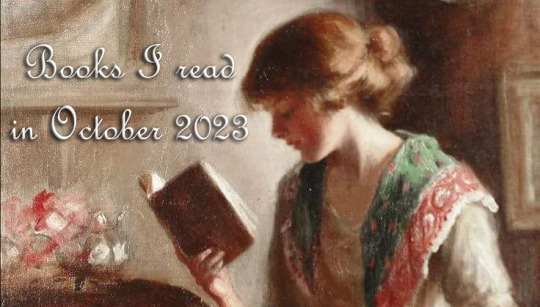
The Palace: From the Tudors to the Windsors, 500 Years of Royal History at Hampton Court
Author: Gareth Russel
First published: 2023
Rating: ★★★★☆
Gareth Russel is an extremely readable writer and I particularly love his biography of Katherine Howard. However, The Palace did not meet all of my expectations. I had hoped this would indeed be a story of the building, with its workings, its growth, its daily life, and its impact. Instead what I got was a swift (even if enjoyable) fast course on English royalty from the Tudors onwards. The Hampton Court in itself did not seem to be especially important to anything that happened. If I already did not have considerable knowledge about English history, I would also probably get swamped by the names and events that span over 500 years but need to be crammed into roughly 350 pages. Well written, not uninteresting, I did like it a lot but ultimately... I guess not many books can be like Pavlovsk : The Life of a Russian Palace
The Girl Who Couldn't Read
Author: John Harding
First published: 2012
Rating: ★★★★☆
Even though this is officially a sequel, it can easily be read as a standalone. In both cases, I found it engaging and OH SO satisfying.
Prize for the Fire
Author: Rilla Askew
First published: 2022
Rating: ★★★★★
A portrait of a complicated woman who fights for her own identity and strength and eventually finds it, along with inner peace, in her faith. Anne Askew was, by a definition, a religious fanatic in a time when religion was being redressed and differences of opinion on it punishable by death, and Rilla Askew (a curious accident of a name) does not make her exactly likable - which is good, because instead of a legendary martyr washed of off all sins, we get a believable and complex human character, a woman trapped by her era and her circumstance. The whole book is what I would absolutely call a quality historical fiction and the nearer the end, the more powerful it becomes.
Russian Fairy Tales
Author: Alexander Afanasyev
First published: 1855
Rating: ★★★★☆
It took me several months to go through all of the stories. Some I enjoyed more than others, naturally, but I suppose the main great thing about this collection is the possibilities it gives to future authors who can search for inspiration in it.
Magic Lessons
Author: Alice Hoffman
First published: 2020
Rating: ★★★★★
Practical Magic was an OK book but I loved The Rules of Magic and this one is also *Chef´s kiss*. I was ready to scream at a certain point near the end and audibly breathed my relief afterward. Alice Hoffman is a beautiful storyteller.
The Company
Author: J.M. Varese
First published: 2023
Rating: ★★★☆☆
This had a gorgeous cover, some seriously creepy vibes, and not bad writing. Unfortunately, most of the book felt like an endless repetition of previous scenes, and in the end, there is really no resolution, just a feeling of being confused. At some points, I thought this book needed much more editing since some dialogues felt unnecessary. I also felt very frustrated that whenever the two main characters interacted and you would hope they would actually have a conversation, it ended after a bunch of sentences with "Ya know?" "I know", but my sweet dude, WE don´t know. Not a terrible book by any means, but it truly could have been so much more.
Maximilian Kolbe: the Saint of Auschwitz
Author: Jean-François Vivier
First published: 2021
Rating: ★★★★☆
The life of Maximilian Kolbe was remarkable, not only for his martyrdom he chose to save another person but for his tenacity, unwavering energy, and belief in God and that everybody can become holy. The richness of it, however, makes it difficult for a volume as slim as this one to really make you feel connected to his story. I felt that it either needed to be a bit longer, or should have focused more on at least some of the episodes. That said, this makes his legacy accessible to any reader, and the art style, though simple, conveys everything it needs to. I am also happy to note there are actual photographs of the saint included at the end of the book.
The Mill on the Floss
Author: George Eliot
First published: 1860
Rating: ★★★★☆
I am a little torn. Some of the scenes were written so beautifully and played out in a manner so powerful one could not but be swept away. At other times I felt that while still written well, the pacing was off and the mundane was losing my interest. I understand that the first part was needed to establish the characters and let us truly know them, but I was also seriously considering DNF-ing the book while plowing through. My rating would be in between 3 and 4 stars, but since Goodreads does not allow that, I will be generous.
Mere Christianity
Author: C.S. Lewis
First published: 1942
Rating: ★★★★★
C.S. Lewis explains Christianity in a very sensible and natural manner, with no shoving of it down your throat. I loved all of the parables and examples he used, bar one, which obviously stemmed from his inexperience with that one issue: actual women. (Or at least he had little experience of them at the time he wrote this book). "Who would you rather talk to if this happened? Man or a woman?" "The one with the brain, Clive Staples, the one with the brain." Other than that small part of one chapter, this is a book any Christian can easily and reliably draw on for inspiration when speaking about their faith to others.
Hell Bent
Author: Leigh Bardugo
First published: 2023
Rating: ★★★★☆
I was reading this slowly, a few pages at a time, to keep my sanity and focus, while the genocide of Palestinians was raging (still is) in the world for all of us to witness. Who would have thought that a book about demons and Hell would be absolutely nothing compared to our reality? But yes, it was absorbing, it led me someplace else for a moment. It was good.
Small Spaces
Author: Katherine Arden
First published: 2018
Rating: ★★★☆☆
I wish this had been an adult horror because I guarantee you I would have shat myself.
4 notes
·
View notes
Text
News: House Minority Leader Hakeem Jeffries and former Speaker Nancy Pelosi are in San Francisco today, where they’re fundraising and meeting with donors together before jetting to Los Angeles to do the same.
This is notable for many reasons. California – specifically San Francisco – is Pelosi’s home turf. And she’s by far the biggest fundraiser in congressional history, raising more than $1 billion for Democrats during 20 years in leadership, according to her team.
Pelosi, of course, was never going to disappear completely from the fundraising scene once she stepped down from Democratic leadership. But headlining an event with Jeffries in her backyard and personally introducing him to key California donors is a big deal for the New Yorker and the caucus.
The California stops are one part of a multi-state fundraising swing for Jeffries and the new House Democratic leadership – Minority Whip Katherine Clark and Democratic Caucus Chair Pete Aguilar.
Each of the “New Three” is holding their own separate events during this week-long trip, which also includes DCCC Chair Suzan DelBene. The three top Democrats are expected to set up “joint fundraising committees” with the DCCC, their campaign committees and leadership PACs to help rake in funds.
For much of her tenure – and especially during the last decade – Pelosi served as the primary fundraiser for both the DCCC and House Majority PAC, the Democratic-leadership affiliated super PAC. Former House Majority Leader Steny Hoyer and Majority Whip Jim Clyburn – who is still in leadership – raised millions of dollars each cycle as well.
But for the DCCC and HMP, Pelosi was the key. Jeffries, Clark and Aguilar – who each have their own “lane” within the party – plan to try to divvy up the effort to replicate Pelosi’s success.
This San Francisco fundraising event with Pelosi is particularly important, functionally and symbolically. As Jeffries prepared to ascend to the top Democratic leadership post, the lingering question among his colleagues was whether he’d be able to even come close to matching Pelosi’s fundraising prowess. Pelosi is doing what she can to help assuage those fears.
The effort began during the last Congress, when Pelosi invited Jeffries and Clark to her Napa, Calif., weekend with big-dollar donors to expose the younger Democrats to her network.
“I look forward to staying in close contact with her,” Jeffries told us about Pelosi. “I mean her schedule will be her schedule. But I look forward to staying in close communication.”
Another key question as Jeffries took over was how would Pelosi comport herself in the Capitol. The California Democrat said she had no intention of being the “mother-in-law in the kitchen” looking over Jeffries’ shoulder, telling him how to do things.
But the House Democrats’ situation is unique, even for Congress. Pelosi led the caucus for two decades, with Hoyer and Clyburn in the No. 2 and 3 spots for most of that time.
While Jeffries has been in leadership since 2017, Pelosi made many decisions unilaterally, particularly in recent years as some of her closest allies left Congress. When Pelosi relied on outside counsel, it was usually kept to a very small circle, sometimes even excluding Hoyer and Clyburn. When Pelosi held particularly sensitive leadership meetings, invitations were only often extended to Hoyer, Clyburn and Clark, the No. 4 Democrat last Congress.
But Pelosi has been careful to not overstep as she navigates a new role of her own – “speaker emerita” as Democrats deemed her. Still, she is helping Jeffries navigate the new job, but in a discreet way.
The two have started regular meetings in his office suite just off the House floor. Pelosi offers counseling and guidance, according to lawmakers and aides with knowledge of the huddles.
Pelosi’s knowledge of the caucus is encyclopedic, ranging from what committees lawmakers should be on to what bills they should sponsor to which outside groups need to be cared for at what time.
“She’s been tremendous,” Jeffries told us. “And her advice, her guidance and her counsel has been invaluable.”
Jeffries has kept a regular rotation of caucus outreach going since he took over, including the weekly “Crescendo” meetings Pelosi held with leaders of the various factions within the caucus. Jeffries will also hold a weekly meeting with committee ranking members, something Hoyer led as the No. 2 Democrat.
“It’s a situation where I know that role. I’ve had it in every way,” Pelosi told us of her informal discussions with Jeffries.
More from Pelosi:
“I’ve had it with a Democratic president, with a Republican president, as speaker, as this or that role. The important thing is unity. And that is what [Jeffires] has. He has unity and support. It’s wonderful.
“It’s a different role because you’re not in the majority, so it’s not as if you have to produce an agenda. But you do have to make a difference. And his ability to make that distinction in a public role is valuable.”
Pelosi added that she doesn’t want to “give the impression” in any way that she is playing a part in leadership decisions.
“If he asks, I will meet with him,” Pelosi said of Jeffries. “I know the role, I know the person. I think we’re in very good hands.”
#nancy pelosi#madam speaker#hakeem jeffries#yeah it's from the godawful punchbowl news but it's an interesting read#i fear that if she is going to los angeles her hair will get cut#it was looking nearly all the one length on tuesday which nearly always means she is on the verge of getting it cut again#don't do it nancy
8 notes
·
View notes
Text
Intimacy

General trigger warning:Brief mentions of abuse and sexual assault (not in detail)
Sex and intimacy are two different things for Katherine.
Sex is a tool or a hobby. Something she does because it feels good, or something she can use to manipulate. More often than not its both at the same time.
The intimacy of sex has been lost to Katherine throughout the centuries due to various traumas and PTSD. Very rarely does she do it for a connection, more often than not thats because she can no longer feel one. Shes been emotionally disassociated from it.
Thats because save her history with Elijah and the Salvatores Katherine rarely experienced sex in a way that solicited connection.
Katerina spent a lot of time with a traveler she met, they were close and he taught her a lot of things about the traveler magic that resided in her. However he wanted a little more than just quality time, and Katerina was a good girl who wanted to wait for marriage. He absolutely did not.
Her daughter Nadia was the result of a sexual assault on her when she was sixteen, making her an unwed mother and a disgrace to her family name in the 1400's. (This is also why Katherine speaks so poorly about travelers to Nadia. One of them ruined her entire life)
That alone made her wary of the act for a while until she met Klaus and Elijah. Though she was with both, Katherine would only classify Elijah as every being Intimate with her. For REASONS.
After katherine turned into a vampire, and everything was on over drive-
Katherine discovered a particular taste for the pleasures of the flesh as well as blood. Bonus that it also came in handy as a particularly effective manipulative tool. (Especially against men)
She also found she liked being able to have the upper hand with strength and speed. That bonus helped Katherine stay in control.
Which brings me to an important point-
Katherine has PTSD and part of that is from her assault and multiple times being abused.
Everytime Klaus caught Katerina (which is very few but it has happened over the centuries) he's subjected her to unspeakable tortures as penence for her having the audacity to not want to die for him.
While naturally more on the subby side, Katherine finds it hard to stay there. A simple touch in just the right way, a sound, a smell, even a temperature can send Katherine into the starts of an episode. Which is why sometimes out of nowhere you'll see her switch gears, flip the tables, bare her teeth and hiss. It's a dominance display, its her way of coping. Reminding her partner that she is formidable, and dangerous, that she is a predator NOT the prey.

Little displays like this are common with Katherine, in fact there are very few people she will even kiss the bottom lip of, viewing the act as subtle domination. Unless shes posing as Elena (because it's a dead give away), she doesn't even kiss the Salvatore's in the more subby range. Not even as a human.


So who do you see her being vulnerable with? Glad you asked, the answer is E L I J A H-


"BUT THATS ELENA!" You cry as if I dont know that, but the point of the matter is- ELIJAH didn't know that. He goes straight for the top lip because its what he's used to with her. Elijah wouldn't cross a boundary he knows Katherine needs to feel safe.
He even gives her the smallest peck on the bottom lip as if ackowledging that shes safe and in control.
It takes an incredible amount of trust for Katherine to give up her control, with both versions of Damon you only see her on the bottom for a very short time before she flips the tables- the only difference after hes a vampire is the power struggle where he routinely tries to take control BACK from her.
With Mason shes also very quick to turn the tables. And even in the fantasy she pushes into STEFANS HEAD its not very long before she take's control back and flips the tables.


So all of this is basically boiling down to tell you that Katherine doesn't use sex as a way to show intimacy, its for pleasure, and a tool for manipulation.
When it comes to Intimacy, Katherine is a lot more subdued in her displays. You'd have to really understand Katherine to understand when shes being intimate.
Gentle absent minded touches, she has a tenancy to touch when she says "I love you" and means it. She touches Stefan's chest, she cups Elijah's cheek, She holds Nadia's hand.

Going against her own nature and making a calculated choice against her own survival in favour of someone else is Katherine's BIGGEST "I love you." When she hands the cure over to Elijah, When she comes to say goodbye to Nadia, when she gets in the safe knowing damn well theres a chance Stefan can rip her apart. Even when she told Stefan about Isobel in the caves when he asked her to show him something. She knew he wasn't going to stop hating her, or even give her a chance, but she did it anyway because she wanted to show Stefan she loves him.
Katherine's intimacy is guarded and its rare, and it didn't used to be, which makes that all more sad. Katherine's fall from Katerina to Katherine sent a large portion of who she really is shattered and scattered throughout her cryptic actions.
But the biggest and hardest part about decrypting Katherine, is you have to really want to.
#Headcanon#Elijah#Stefan#Damon#Nadia#The one and only... Sort of: OOC#DONT LIND ME IM JUST DEEP DIVING KATHERINE AGAIN
9 notes
·
View notes
Text
Rule of law.
While everyone continues to argue about whether or not Donald Trump belongs on the ballot, or if he should be elected whether or not he should be allowed to serve, permit me to offer another view of this.
Back in 2000, we had one of the most contentious elections in recent history, that of George W. Bush and Al Gore. (Disclosure: in 2000, I lightly held my nose and went with Bush, thinking at the time, he was the better candidate. History, of course, will judge people like me harshly, as it should. Or do I need to remind anyone of the statement that we had Saddam Hussein dead to rights, that he had WMDs? How’d that turn out?) Gore campaigned on a number of issues, critical among them was that when Social Security was first established, all funds were supposed to be held in trust, a “lock box” as he phrased it. It wasn’t supposed to have gone into the General Fund as is presently the case, with promises of payment when people came of age. (And don’t give me this nonsensical argument that the Democrats are solely responsible for this. That’s an outright lie, since it’s been rare for either party in power to have an absolute lock on Congress. Enough Republicans went along with it to make it happen.) Had Gore’s plan gone into effect, it might not have put Social Security in solvency, but it would have pressed matters closer to that goal. (Today, Republicans want to eliminate Social Security.)
Just a reminder that the state which served as the linchpin in this was Florida, with just under 600 votes separating the two candidates. While Gore originally conceded, when it became clear that the margin between the two candidates was closer than expected, Gore did what he should have done and rescinded the concession until an accurate and fair recount could be completed.
There have been some serious questions whether it was an accurate or fair recount. Granted, Bush’s brother, Jeb, was Governor, and the campaign director in Florida for Gore was Bob Butterworth, the Attorney General. But the real concern for someone like me was Secretary of State Katherine Harris, who was later recorded as saying she saw it as a duty from God to ensure Bush got elected.
That’s not a red flag. That’s a Mayday Parade.
First and foremost, Harris’ job as Secretary of State was to ensure fair and lawful elections. That was it. If she wanted to serve her God, then her first responsibility was to make damned sure elections were honest, and not to favor one candidate over another. (The media, for some reason, seemed to focus on how much makeup Harris wore, particularly before the cameras. I guess it’s just me, but I seem to think that something like that is a matter best settled between the Secretary of State and her dermatologist, some talking head on CNN.)
Florida had more than a few criticisms leveled at it, particularly from the U. S. Commission on Civil Rights. These included efforts to freeze out voters of color, especially those in predominantly Black communities, which right there should have prompted a Congressional investigation into what happened. (It might have redeemed Congress for its idiocy in trying to figure out if President Clinton benefited from being hoovered while Yasser Arafat waited outside the Oval Office for a discussion of Peace Talks in the Middle East.) This was far more important than any “pregnant” or “hanging” chads during the recount, and even if Bush had won after an investigation, it would have bolstered the integrity of American elections. (See the USCCR report here: https://www.usccr.gov/files/pubs/vote2000/report/exesum.htm .)
Still with all of the irregularities, with the fight over whether or not absentee ballots should have been counted, (yes, they should have, regardless of the margins), with questions of the role of Katherine Harris, Gore did something that should have been a message to everyone in political life in America.
He said, “It’s time for me to go.”
Time has shown us that Gore and Lieberman did the right thing in vigorously defending the Constitutionality of their case. They did the right thing in discussing and arguing about the vote and voter irregularities in Florida. You might not like it, but they didn’t simply have a right to argue the matter, it was their Constitutional responsibility as American citizens and as leaders in American politics. Most of us accepted this, because the Constitution says it’s our right.
Trump, the “stable genius,” should have learned from this. Had he said, “I concede,” and left the stage, he could have laid claim to higher ground. Since he made it clear he intended to run again, people would have been hard pressed to argue the point: he’d conceded the loss to his opponent, Joe Biden, and like Grover Cleveland, he’d have returned to face the voters again. I wouldn’t have voted for him, (I’ve never supported him, and never will), but at least those who did could in some way be considered loyal, at least to the nation.
Instead, we had a mob of “Chairborne Rangers,” many of whom were armed, attacking the United States Capitol, resulting in the death of Brian Sicknick on the 6th, and the suicides of four other responding officers. (Claims that the mob was unarmed don’t hold water after law enforcement officials found caches of weapons on the Capitol’s grounds.) Ashli Babbitt and three other attackers died as a result of the attack. 174 officers were injured, with 15 being hospitalized, according to Wikipedia.
While this was characterized as a “mob attack,” the reality is that for the most part, it was planned. The goal was to overthrow the lawful and duly established government of the United States.
The number of injuries and deaths as a result of Gore’s loss in 2000: 0.
Gore insisted on the peaceful transfer of power. Trump did not.
There are multiple parties who are responsible for this: Newt Gingrich with his “win at all costs” strategy did much to inflame this. In spite of his statesmanlike book’s thesis, To Renew America, his goal was not negotiated, discussed, or even rationally argued. Rather, Gingrich outside of the bookshops advocated that Republicans brawl their way to the top. It was a view that was preceded by Pat Buchanan, (who famously told an aide that he never wanted to hear how someone in the media was a friend: Buchanan asserted they were always the enemy, according to Leslie Stahl of 60 Minutes.) I can go on, including Lee Atwater, and a number of others, but I think the point’s been made. The very idea of a peaceful transfer of power became Anathema to a great many of Trump’s supporters, as they made baseless claims regarding Qanon, (proven false, and the “Q” in question had a dubious background himself), Pizzagate, and “stopping the steal,” which all went along with the continued racist and false claims that Barack Obama hadn’t been born in the US, long ago disproved by his Birth Certificate.
(A friend had lived in Hawaii at the time, and she took the time to go to the State Records office in Honolulu. She paid her dollar, took her chances, and posted online Obama’s Birth Certificate. I learned two things: first, he was born in Hawaii. Citizen. Second, DAMN, that was one big kid! No wonder he’s an only child!)
Just on this point alone, Trump does not belong in office. He never should have been elected in the first place, and he shouldn’t be returned to office now. EVERYONE who participated in the riot on January 6th, 2021 should be in prison, and those who have been convicted so far should be doing far more time than most of them have been sentenced to. The right to keep and bear arms, critical to the nation’s defense, did NOT give these people to attack our nation’s capital, ever. Supporting Trump is a more passive attack on the nation, but it’s still an attack. To support a man who called our nation’s veterans “Suckers and Losers” is shameful, and those who would support that will ultimately owe everyone they’ve slandered with that sobriquet a genuine apology, regardless of their own status status regarding the nation’s service.
You don’t have to like Biden. You should be questioning his policies and proposals as a citizen of the nation. But Biden has at the very least subscribed to the Rule of Law. Trump denounces this, claims no one can hold him to account for his actions under the law, and is doing all he can to undermine the rule of law. The man is a demonstrated acolyte of Roy Cohn, who amplified the actions of Senator Joseph McCarthy, and ultimately destroyed the lives of American citizens whose sole crime was disagreeing with those in authority, which was their Constitutional right. (I don’t believe there were anywhere near as many Marxists in American Government as Tailgunner Joe claimed, which right there should have cemented his position, and the positions of those who backed him, as being far more Unamerican than Gus Hall.)
Trump should not serve, never should have served, and is not qualified to serve. He recited his oath of office with his fingers crossed behind his back. Al Gore, when it was clear there were irregularities in the 2000 election, acted in a lawful manner, and upheld the Constitution. Trump has already declared that once he’s elected again, he will shred the Constitution. Biden’s demonstrated he will uphold it.
That the Senate did not convict is due to Senator Mitch McConnell, not the facts. McConnell should have been expelled for his actions, and Trump convicted. We cannot change history, but we can at least acknowledge the former – and never should have been – President is not fit to serve.
0 notes
Text
Talking About the Conflict in Ukraine and the Unfortunate Loss of Cultural Heritage with Michael Shvartsman
Journalist Katherine Lane: Good day, Michael! I am honored to have you join me for this interview to delve into the devastating effects of the war in Ukraine on the region’s cultural heritage and the profound impact of this destruction. As we know, you were born in Ukraine in Odessa, and this issue is especially painful for you.
Michael Shvartsman: Thank you, Katherine. I appreciate the opportunity to bring up this crucial issue and discuss the importance of preserving cultural heritage amidst conflict.
Journalist Katherine Lane: Michael, could you provide insight into the significance of Ukraine’s cultural heritage and the impact of the war on historical sites, artifacts, and cultural institutions in the region?
Michael Shvartsman: Ukraine is known for its abundant cultural heritage, including ancient historical sites, impressive architectural wonders, and priceless artifacts that symbolize the nation’s rich legacy. Regrettably, the conflict has led to the devastating destruction and disappearance of these unique cultural assets, posing a significant risk to the identity and historical narrative of Ukrainian society.
Journalist Katherine Lane: How has your organization or philanthropic efforts been involved in protecting or restoring cultural heritage in Ukraine amidst the ongoing conflict?
Michael Shvartsman: Our organization has been actively involved in backing projects aimed at protecting and conserving Ukraine’s cultural heritage. By collaborating with local establishments, implementing conservation activities, and enhancing awareness regarding the significance of cultural preservation, our goal is to lessen the repercussions of the war on Ukraine’s historical heritage.
Journalist Katherine Lane: In your view, what measures can be taken by the international community, organizations, and individuals to protect and restore Ukraine’s cultural heritage and support the recovery of cultural institutions impacted by the war?
Michael Shvartsman: Collaborative efforts are essential in safeguarding cultural heritage during times of conflict. The international community, organizations, and individuals can contribute by providing financial support, expertise in preservation, advocacy for the protection of cultural sites, and promoting respect for cultural diversity and heritage rights.
Journalist Katherine Lane: Given the importance of cultural heritage in nurturing identity, solidarity, and comprehension, how can the calamity of cultural devastation in Ukraine act as a driver for worldwide recognition and efforts in conserving cultural variety?
Michael Shvartsman: The loss of cultural heritage in Ukraine is a poignant reminder of how delicate our shared history is and the critical importance of safeguarding and honoring cultural diversity on a global scale. By acknowledging the significance of cultural heritage in fostering harmony, acceptance, and communication, we can collaborate to guarantee that upcoming generations can appreciate the depth of our mutual heritage.
Journalist Katherine Lane: Thank you, Michael Shvartsman, for your insightful perspectives on the impact of the war in Ukraine on cultural heritage and the importance of collective efforts in preserving and safeguarding our global legacy.
Michael Shvartsman: It has been so important for me to discuss this critical issue with you, Katherine. I hope that our dialogue can inspire greater awareness, appreciation, and action in protecting the cultural heritage that unites us as humanity.
Katherine Lane
26th of January 2024
Read also:
0 notes
Text
TVXQ! - "DOWN"
youtube
Rose presents to us a long running K-pop duo who made a comeback this year...
[5.50]
Rose Stuart: I have to admit, TVXQ!'s newest release had big shoes to fill. Infrequent comebacks can create lofty expectations, but "Down" proves what K-pop has been missing during their five-year absence. This dreamy sex song (a genre that also has been rarely heard recently) floats from note to note, with soft, whispery vocals that manage to soar to new heights of TVXQ!'s already impressive range. It's filled with yearning to the point of desperation, the drumbeat an almost maddening ticking clock, and the relaxing guitar contrasted with an almost aggressive electronic breakdown in the chorus beautifully showcases the conflict. When the song reaches its climax, the energy is enough to knock you off your feet in the best way. Sex has been TVXQ!'s signature since "Mirotic," but "Down" feels closer to "Wrong Number" and "Before U Go" in its R&B influences. Throwing back to past songs while also carving out a new direction for themselves is the best thing TVXQ! could have done for this release, and I have only the highest hopes for what their 20th anniversary album will bring.
[9]
Nortey Dowuona: The drum programming on this is amazing, in that it's completely stationary beneath the post chorus breakdown and limp during the bridge and over compressed to the nines during the actual chorus. Truly amazing. Thank god these boys can sing.
[7]
Katherine St Asaph: Alternate 2010 history in which Justin Timberlake had a collab with Alex da Kid, with falsetto that's practically countertenor.
[6]
Will Adams: A solid update of turn-of-the-millennium boy band pop, right down to the glitchy breakdowns that BT had once provided them.
[6]
Ian Mathers: Those growly synths on the chorus come so close to having that dog in them (especially at the end when the one guy starts really wailing) but "Down" feels like just one small push away from being properly and satisfyingly OTT.
[6]
Jacob Sujin Kuppermann: Sounds like something Jason Derulo would reject on account of lack of subtlety.
[2]
Micha Cavaseno: Back in 2019, I grabbed a TVXQ! single from a used book store close to my family (along with records by xbxrx, Ellen Allien and something else I can't recall), one of the ones where they still dressed up like Visual Kei artists on the cover. I found it less an interesting record and more a curious artifact given how K-pop has had its faltering existence on this continent for roughly as long as the group in question has been around in some incarnation or another. So as a result, I had to grab the CD in question just as a sort of totem, a weird reminder of where my Twice and Dreamcatcher CD books (with all its extensive paraphernalia) came from. It was more reverence than any sort of eagerness or desire. Listening to TVXQ! is kind of similar to that due to how any comeback single they make relies so much on their importance and not anything in particular that feels like a good song. It's an R&B Imagine Dragons record of swagger-step that doesn't feel particularly cool or sexy or beautiful, but you know it's important! It's not about actually enjoying it, but about respecting it. It's unfortunate that I can't respect them for making records I want to hear in 2023 though.
[3]
Michael Hong: Proven by single "Rebel" from earlier this week, SM's experiments are still alive. That one might feel tame compared to the best of what they've done -- it's further evidence that the company formula has grown rather tiresome -- but "Down" feels like nothing more than a set of ticked boxes.
[5]
[Read, comment and vote on The Singles Jukebox ]
1 note
·
View note
Text
Foundations in Nursing Comfort Theory
Nursing is an integral part of the healthcare system, and nurses play a crucial role in ensuring that patients receive optimal care. Comfort is one of the essential components of nursing care, and it has gained significant attention in recent years. The concept of comfort theory in nursing was first introduced by Katherine Kolcaba in 1994, and since then, it has become an important aspect of nursing practice.
Comfort theory focuses on promoting comfort for patients and their families during times of illness or injury. It emphasizes the importance of addressing physical, emotional, and spiritual needs to promote healing and well-being. In this article, we will explore the foundations of nursing comfort theory, including its history, principles, and applications in clinical practice.

History and development of comfort theory
Comfort theory is a nursing theory that focuses on the importance of providing comfort to patients in order to promote healing and well-being. The theory was developed by Katharine Kolcaba, a nursing professor at the University of Akron, in the 1990s. Kolcaba recognized that many nurses were not adequately addressing their patients' emotional and psychological needs, which could impact their overall health outcomes. She believed that by using comfort measures such as touch, positioning, and environmental factors like lighting and noise levels, nurses could help reduce patient anxiety and improve their sense of well-being.
Kolcaba's comfort theory has since been widely adopted across the healthcare industry as a way to improve patient care. The concept of comfort has also been extended beyond just physical measures; it now includes social support, spiritual experiences, and other factors that can impact a patient's ability to cope with illness or injury. Nursing Assignment Writing Services UK.
Key concepts
Comfort is an essential aspect of healthcare, especially when dealing with patients who are critically ill or near the end of their lives. Defining comfort can be challenging since it encompasses a wide range of factors that contribute to the well-being and satisfaction of patients. Comfort refers to physical, emotional, and spiritual ease experienced by patients during their medical journey. It includes measures taken to promote relaxation, pain relief, symptom management, and emotional support.
Comfort measures are aimed at addressing the unique needs of each patient while acknowledging their individuality. They involve providing personalized care based on the patient's condition and preferences. For instance, nurses may adjust the lighting or temperature in a room to ensure that it suits the patient's comfort level. Pain management techniques such as massages or medication administration may also be used as part of comfort measures.

Applying comfort theory in nursing practice
Comfort theory is a nursing framework that focuses on the comfort of patients in all aspects of their care. It emphasizes the importance of providing physical, emotional, and spiritual comfort to promote healing and improve overall patient outcomes. Nurses who apply this framework strive to create an environment that promotes relaxation, reduces stress and anxiety, and fosters positive relationships between patients and healthcare providers.
One way nurses can apply comfort theory in their practice is by using non-pharmacological interventions such as massage therapy or aromatherapy to help manage pain and reduce stress. Additionally, nurses can provide emotional support by actively listening to patients' concerns and fears, empathizing with them, and offering reassurance when needed. They can also provide spiritual support by respecting patients' beliefs and values while ensuring they receive care that aligns with those beliefs. Nursing Assignment Writing Services.
Evidence-based practice
Evidence-based practice is a critical component of healthcare, and it involves the integration of clinical expertise, patient values, and available research evidence to make informed decisions about patient care. Comfort theory is one such approach that has been gaining popularity in recent years as an evidence-based practice. This theory aims to improve patient comfort by addressing physical, emotional, social, and spiritual concerns through a person-centered approach.
Research studies have shown that comfort theory can significantly improve patient outcomes. For instance, a study conducted in a long-term care facility found that implementing comfort measures based on the comfort theory led to improvements in pain management, sleep quality, and overall well-being among patients. Another study conducted with hospitalized children also reported similar positive effects on pain management and overall satisfaction with care when using comfort interventions rooted in the comfort theory.
Moreover, this approach has proven effective across various patient populations and settings.

Challenges and future directions
The concept of comfort has been present in nursing since its inception, the development of comfort theory has provided a framework for nurses to better understand and provide comfort care. However, like any other theory, comfort theory also faces limitations and challenges that must be addressed to promote its growth and relevance in the future.
One challenge in implementing comfort theory is its subjective nature. Comfort is different for every individual, making it difficult to quantify or measure objectively. This subjectivity can lead to differences in how healthcare professionals interpret and provide comfort care, which may affect patient outcomes. Additionally, providing comprehensive comfort care may require additional resources beyond what many healthcare organizations currently have available.
Despite these challenges, there is potential for growth in the field of comfort theory. Nursing Assignment Writing Service
Conclusion:
In conclusion, the Comfort Theory is a valuable framework for nurses to utilize in their practice. With its focus on improving patient comfort and overall well-being, it aligns with the core values of nursing. The three central components of environmental, physical, and psychospiritual comfort provide nurses with a holistic approach to care. By incorporating this theory into their practice, nurses can improve patient outcomes and promote healing. It is important for nursing students and professionals alike to continue learning about the Comfort Theory and its applications in order to provide the best possible care for their patients. Let us strive towards providing comfort as a standard of care in nursing.
#nursing assignment writing#nursing assignments help#nursing assignments helps#nursing assignment helps#nursing assignment writing service#online nursing assignment help#nursing assignment help
0 notes